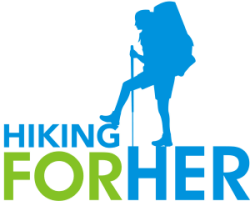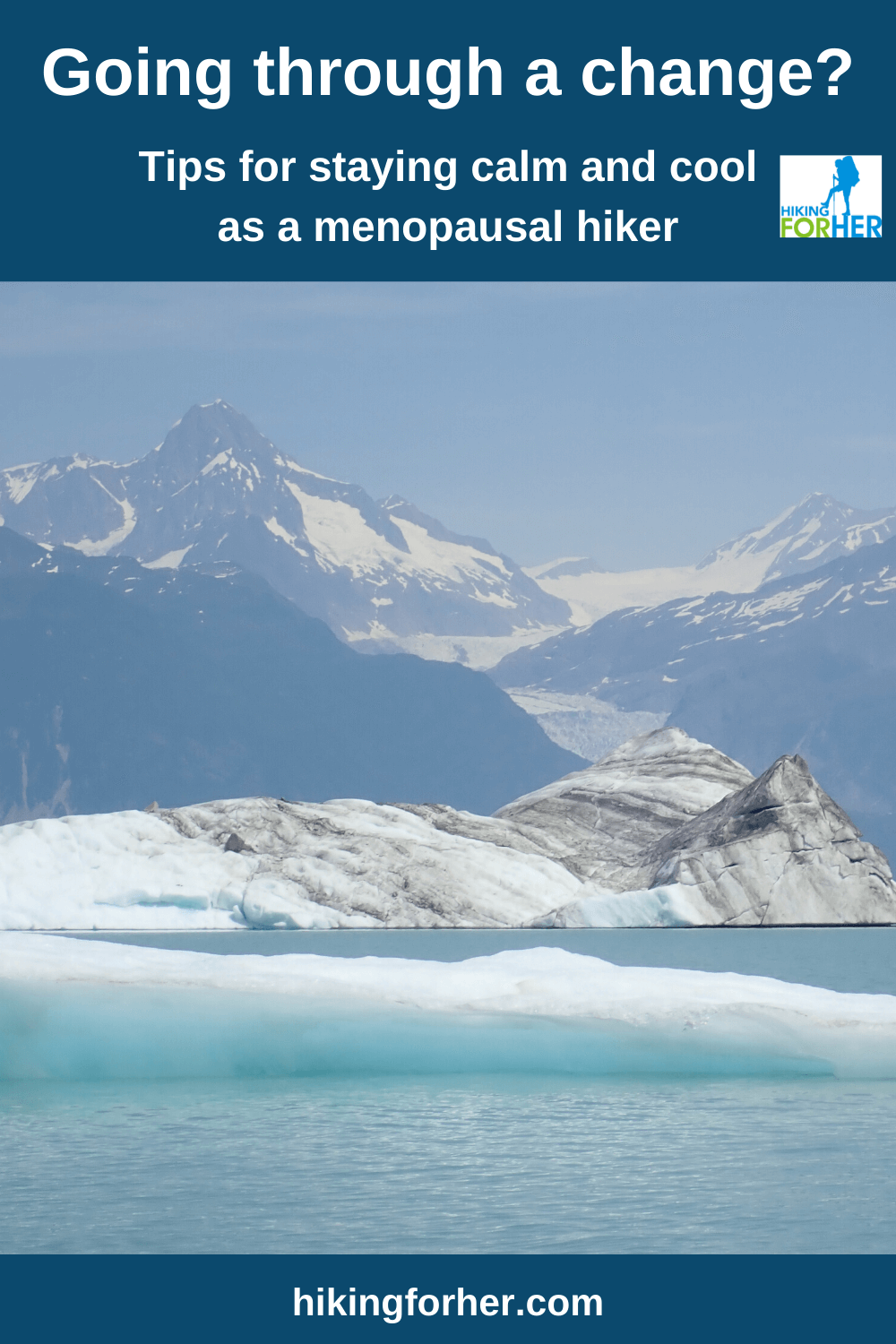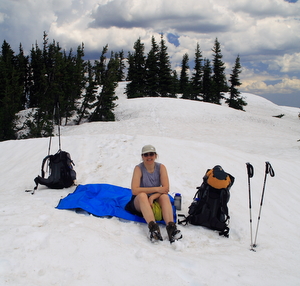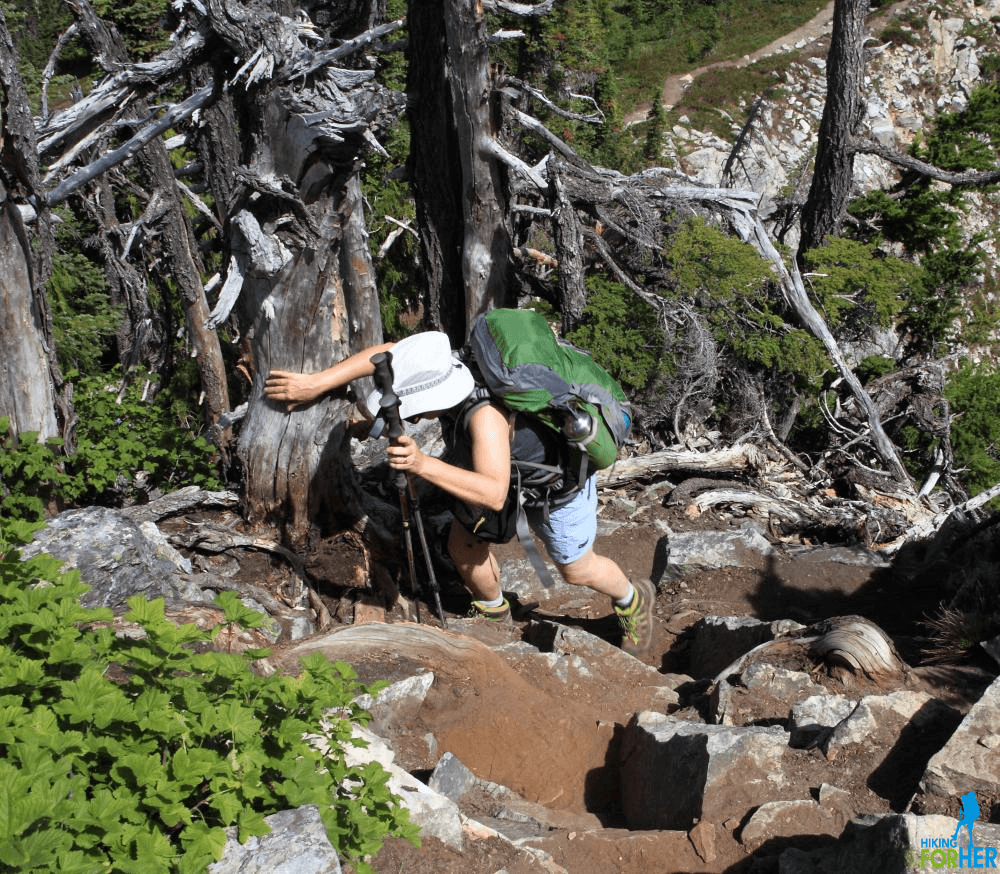Menopausal Hikers:
Tips For How To
Embrace The Change
By Diane Spicer
Welcome, menopausal hikers!
First, a bit of celebration.
- No more monthly interruptions in our hiking schedules.
I don't know about you, but I always found the cramps, the frequent stops to change pads or tampons, and the personal hygiene issues related to menstruation to be impediments to a satisfying hiking trip.
Don't get me wrong.
I appreciate being a female.
I deeply appreciate the fact that my monthly menstrual cycles resulted in my two wonderful offspring.
But I do not miss having periods.
There, I've said it.
Now let's move on to explore this normal transition from a menopausal hiker's perspective.
Menopause is normal!
If you're in your forties (perimenopausal), these issues might be of interest because you can prepare yourself in advance to stay strong on hiking trails.
If you're in your fabulous fifties, you're aware already that things are changing in your body.
Here's why....
The trade-off for no monthly bleeding is less estrogen in the body.
And that affects more than just the reproductive system.
- Read this humorous article for a glimpse into the total body changes of menopause.
Specifically for menopausal hikers, we're focusing on changes in bones, heart, urinary bladder, cognition, and balance.
- And how that impacts your hiking career.
Let's take a look at each of them in turn to see how those changes affect us on the trail.
Bone strength
for menopausal hikers
Estrogen levels are decreasing as women head into their fifties, putting them at an increased risk for fracture compared with younger women, and also compared with men of all ages.
Why?
- The hormone estrogen prevents bone loss by telling the bone destroying cells (osteoclasts) to chill out.
Which bones?
Any of them, but for menopausal hikers, we're concerned with hips and vertebrae (backbone) because they bear our weight and give us maneuverability on the trail.
How to protect those precious bones?
For starters, be smart about how you put on your pack (good ergonomics).
- Bend your knees, swing the pack onto one thigh, then hoist it to your
shoulder. Here's a video to explain the process in more detail.
Better yet, use a handy rock or log as a prop and sit down
while you get your pack on.
Even better, ask your hiking partner to lift
it for you!
I avoid this whole thing most of the time by keeping my pack on at all rest breaks shorter than 15 minutes, taking it off only at lunch time and at the end of the day.
Another thing to consider: is your backpack packed properly? Weight distribution matters!
Guard against bone loss
Another bone protector: regular moderate weight bearing exercise.
-
Take daily walks with a light pack or wrist weights. Work your way up to a heavier pack.
- Do some moderate weight lifting - use filled water bottles if you don't want to invest in fancy weights or a gym membership.
- Carry your own groceries and grandchildren.
Getting a bone density screening (DEXA) to keep an eye out for osteoporosis may be a good idea, especially for women over the age of 65 years.
Your "T score" is the number your health care provider wants to know.
It's tough to build lots of bone density after menopause, so be sure to keep what you have.
Diet plays into this in a big way.
Adequate vitamin D (many respected authorities recommend 400 to 800 IU each day) and calcium (1000 to 1500 mg each day has been recommended) levels give your bones the necessary building blocks.
So be sure you're getting enough each
day to safeguard your bone mass via dairy products, leafy greens, and canned fish with bones.
Cardiovascular issues
for menopausal hikers
Before menopause, women enjoy protection from heart disease compared with men.
As menopause approacheth, things start to even out.
The fat
content of your diet becomes even more important, as does stress
management, smoking, and activity level. These all play into cardiovascular (heart and blood vessels) health.
Since you're a menopausal hiker, I'm guessing that you already have good baseline levels of cardiovascular fitness.
Let's keep it that way, shall we?
Move it to keep it strong!
If you are a "week-end warrior" type of hiker, maybe you should give your heart muscle daily exercise to keep it ticking along without problems.
Suggestions for you to incorporate into your day:
- Take the stairs.
- Park far away from
the door and use a brisk pace to reach it.
- Climb a hill every evening and gaze off into the distance,
plotting your next hiking adventure.
- Dance! or at least jump around to
music while you're vacuuming or brushing your teeth.
- Just be sure you get 30 minutes of moderate intensity exercise each week day (with more on week-ends on a hiking trail, right?).
Pressure matters
Do you know your blood pressure?
- Inexpensive monitors can give you a baseline reading.
- Some drugstores have free blood pressure machines, or seasonal wellness events.
The "bottom" (diastolic) number is what really counts: you want to be somewhere around 80 - 90 millimeters of mercury (mm Hg).
If it's creeping higher, talk things over with your health care provider.
The "top" (systolic) number shouldn't wander too far over 140, either.
Cholesterol
While we're at it, a word about cholesterol is in order.
Every 5 years you might want to consider a complete lipoprotein panel.
This allows you to monitor how much cholesterol and fat carrying proteins you have in your bloodstream.
There are "good" lipoproteins and "bad" ones.
Your health care provider can get you sorted out on which are which, and what your values should be for your age range.
Menopausal hikers need to watch out for elevated LDLs and decreased HDLs, along with increased triglyceride levels - all because of that darn disappearing estrogen.
Urinary bladder leakage
Here's a distressing subject for menopausal hikers: urine leakage.
It can be very distressing to sneeze and feel a spurt of urine.
On a hiking trail, this causes chafing, and the odor can be problematic.
Why does it happen?
Estrogen, one of our lovely female hormones, is starting to become scarcer (same story as above).
The muscles controlling urination are not getting as much hormonal attention, and will shrink in size (atrophy).
This gives you less control over your bladder function.
So when the intra-abdominal pressure increases during a cough or sneeze, you lose urine to the exterior (incontinence).
Ditto for an unexpected big step off a rock or an uneven trail.
And you might resonate with this T-shirt slogan I saw recently:
"Sometimes I laugh so hard, tears run down my leg."
Be prepared
A few ways to be prepared:
Wear a light pad, one that is specifically
designed to absorb urine, not menstrual flow.Cross your legs when you
feel a sneeze or cough coming on.
Include pelvic floor strengthening exercises in your daily exercise routine.
- These muscles follow the same credo as all other muscles: use it or lose it.
Brain fog
My personal favorite (not!) as an older female hiker: brain fog.
- Or "fading cognition", if you prefer the medical term.
Another little "gift" to look forward to, as you head into menopause! as a hiker
Medical journals also refer to this as "cognitive decline".
- Ha! Not
decline, just a temporary inability to locate memories or words.
- They're in there somewhere, just give me a minute...
So what's going on?
Really, isn't it bad enough that our bones are crumbling, our hearts are weakening, and our bladders leak?
(thank you, Suzy Sunshine)
Now we can't remember where we put the bag of dog food we bought yesterday.
- Or the dog's name.
Alas, the brain is also going into estrogen withdrawal.
And sometimes we're moody and irritable, on top of being forgetful.
So I have a little plan to keep myself sane.
- I learn one new thing every year - something with some cognitive demand to it.
- I read a
new textbook cover to cover in my field (I teach for a living). Update: Retired now, but still reading!
- I keep updating my map collection and plotting new routes.
- I learn a new hiking skill that requires dexterity or memory: knot tying, for example.
Other menopausal hikers might enjoy puzzles or games.
Just promise me that you'll do something to keep your brain active and engaged in new learning activities.
Because I want to see you out on the trails.
- We can wink at each other as we float effortlessly past those estrogen rich thirty somethings ;)
Balance, or lack thereof
There's not much in the scientific literature about the loss of balance during menopause.
Instead, it's correlated with aging.
So I won't blame my increasing clumsiness on lack of estrogen, but instead I'll point to my wealth in years: I'm accumulating trips around the sun, AND losing my balance.
Such a deal! (I think not)
I noticed an increase in clumsiness about two years ago.
- My usual rock steady rock-hopping ability as I crossed a stream let me down.
- I couldn't judge how to hop
and land on a rock.
- I stood in the middle of the stream and had a sudden flash of anxiety about falling into the swiftly moving water.
- Then I tumbled in.
This was a
completely new experience for me. Can you relate?
At the time, I wrote it off as a momentary balance glitch.
Until it happened again on the trail a few weeks later, when I tripped on a tree root and face planted.
News flash
along with the hot flashes
That's when I became a staunch advocate of using hiking poles.
Now when I stumble or waver, I have a pair of allies to keep me upright.
The poles give us menopausal hikers an extra layer of confidence as we negotiate rocky narrow sections of trail, or tap dance over slippery roots.
I no longer dread stream crossings, because I use my poles to:
- probe water
depth
- check out the stability of the next rock before I put my weight
on it
- lean on one pole as my foot pushes off to take that next step
Of course, poles take a load off your knees when you're going downhill, too, but that's just an added bonus.
Wait, no!
- That's a smart move to preserve your precious, non-renewable joint cartilage.
- And they give you a nice upper body workout, too.
Hot flashes
and night sweats
I just have to say a few words regarding "vasomotor instability" and "thermoregulation dysfunction".
- You know, the joy of hot flashes and night sweats!
Statistics predict that 75% of menopausal hikers will experience these, especially within the first 2 years after menstrual cycles stop.
For myself, I've found these bursts of heat extremely useful during cold weather excursions.
In fact, here's a photo of me enjoying a hot flash! I like to think of it as "being my own star": emitting heat as a natural part of my life cycle.
True, hopefully encouraging, story
My very first hot flash occurred in a tent on the flank of Mt. Adams (Cascade Range, Washington State USA).
- I thought I was having a heart attack!
Eventually it dawned on me how great the extra warmth in my sleeping bag felt.
So don't fight it....embrace it.
To help you, here are some strategies for hiking with hot flashes.
I've heard other women refer to these as "power surges".
I kind of like that idea!
Night sweats, not so much.
- Tips for how to deal with those inside your sleeping bag coming soon.
- How to choose a good backpacking sleep system
Menopausal hikers:
a call to action
So there we have it: menopausal hikers must acknowledge and work with the changes in our bodies as we lose an abundant estrogen supply in our bodies.
Have you noticed that menopause is a touchy subject in American society?
The whole aging thing is a touchy subject!
This truly puzzles me.
When did getting older become equated with becoming "less than"?
As an older woman and hiker, I feel just as strong and confident as I ever did out on the trail, and WAY smarter.
I look at all of the years I've spent hiking as training for the next phase of my outdoor career: campaigning for elder hiker of the year!
I hope you do, too.
Over Forty Hiker community
Want to join a truly private (not Facebook) group of women who know what it's like to experience all of the age related events mentioned on this page?
We're smart, savvy and waiting to welcome you!
Menopausal hikers:
call to action
Let's show the younger hikers what it means to be an experienced, smart, fabulously menopausal (or post-menopausal) hiker!
Send me your thoughts on how you incorporate this call to action into your trail time.
It's been said before, but bears repeating:
We're not getting older, we're getting better!
Menopausal Hikers



